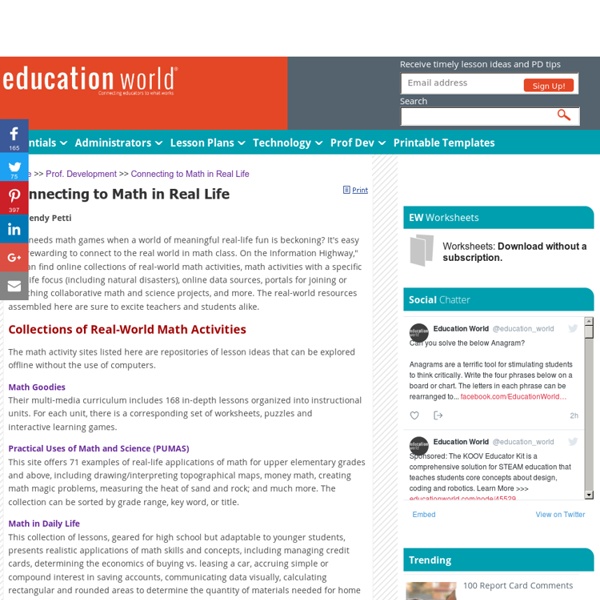Great Maths Teaching Ideas
The Standards Unit are a collection of resources produced in response to the Smith Report by the Department for Education and Skills. They use ‘active learning’ strategies that were originally planned for use post-16 but have now been introduced into the secondary sector. The well known Dr Malcom Swann of Nottingham University played a big role in the development of the resources that span the whole secondary maths curriculum. I personally use these resources a lot and consider them to promote high levels of mathematical thought and making connections between topics. If you would like to purchase a hard copy of the Standards Unit you can from the NCETM website. Enjoy! Mostly Number N1 Ordering fractions and decimals N2 Evaluating statements about number operations N3 Rounding numbers N4 Estimating length, using standard form N5 Understanding laws of arithmetic N6 Developing proportional reasoning N7 Using percentages to increase quantities N8 Using directed numbers in context N12 Using indices
107 Favorite iPad Apps for K-8
Great iPad apps for K-8 Tablet computing and mobile devices promise to have a dramatic impact on education. A growing number of schools across the world are jumping on the digital bus and embracing iPads (less often, other tablet products) as the latest tool to teach literature in multimedia, history through games and simulations, and math with step-by-step animation of problems. Not surprisingly, student scores improve when they use iPads and their interest in school soars. In my school, we have been rotating one set of Pads this year through K-8. Drawing AirSketch Free–Turn your iPad into a wireless whiteboard! Geography Atlas–Barefoot World Atlas is an interactive 3D globe for iPad that invites children to explore the regions and countries of the world, discovering hundreds of fascinating features and immersing themselves in the rich wonders of our planet.Stack the Countries Lite Terra–Stack the Countries Lite makes learning about the world fun! Health History Maps Math Algebra Intro–Free.
Math Resources
FREE Real World Math Problems for Homeschool
I’ve found that math can get rather boring if all you do is learn a problem style and then do a page of problems with that style, so lately I’ve been on the hunt for some free real world math problems that would stimulate curiosity in the kids. Here are my favorite sites that I’ve found with FREE problems. Source: cityyandcolour.tumblr.com via Nicole on Pinterest Figure This! This site has about 80 different Challenges that you can choose based on mathematical skill set necessary. We haven’t used these yet, but they are on our to try list. Franklin Institute This site has quite a few different types of problems ranging from Melting Pot Math to Toothpick Puzzles. Real World Math: Using Google Earth in the Math Curriculum They have lessons based on concepts, project based learning, space, and more. Make it Real Math and States by the Numbers by Make it Real Learning So, what about you?
Free Math Worksheets
Math Riddles: Try to answer these brain teasers and math riddles
Riddle 1 How can you add eight 8's to get the number 1,000? (only use addition) The key to this math riddle is realizing that the one place must be zero. 888 + 88 + 8 + 8 + 8 = 1,000 Riddle 2 Two Fathers and Two Sons Riddle Two fathers and two sons sat down to eat eggs for breakfast. one of the 'fathers' is also a grandfather. In other words, the one father is both a son and a father. Riddle 3 Digit Frequency Part I. The most common digit is '1.' Part II. 0 is the least common digit even though 1,000 has three zero's ! Explanations for both riddles The digits 0 through 9 all follow the same pattern there is exactly 1 occurrence of each digit for every ten numbers. For instance the digit 2 appears once between 10 and 19, at 12. Again, let's look at 2 which appears in 20,21,22, 23, etc.. as well as 200,201, 202,203.. So to figure out how to answer the first riddle you had to see what distinguishes the number 1? Riddle 4 Three Guys at A Hotel Riddle Three guys rent a hotel room for the night. Riddle 5
Math in Daily Life
When you buy a car, follow a recipe, or decorate your home, you're using math principles. People have been using these same principles for thousands of years, across countries and continents. Whether you're sailing a boat off the coast of Japan or building a house in Peru, you're using math to get things done. How can math be so universal? Join us as we explore how math can help us in our daily lives. Ready to get started?



